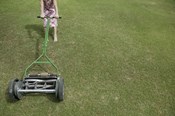Most lawns in New York already have enough phosphorus and don't need supplementation, especially if clippings are left on lawns, according to recent research by Marty Petrovic, a turf specialist at Cornell University. He says that new guidelines can help promote an eco-friendly lawn.
"The first step to minimize the environmental impact of your home lawn is to raise the mower's blade to a height of 3 to 4 inches -- usually the highest setting on your mower -- and leave the grass clippings on the lawn to recycle nutrients," says Petrovic.
Taller grass competes better with weeds and sinks roots deeper into the soil to better withstand midsummer heat and drought, explains Petrovic, and such lawns require less watering and prevent soil from washing away.
In analyzing soil tests sent to the Cornell Nutrient Analysis Laboratory for lawn fertilizer recommendations, Petrovic found that at least 80 percent had enough phosphorus already. When soils are extremely high in phosphorus, Petrovic has found that it dramatically increases the amount that runs off into lakes and streams, where it can promote algae blooms and eutrophication (excessive nutrients in the water) and reduce water quality.
Other tips to promote a "green," eco-friendly yard:
* Keep your mower's blades sharp for a clean cut that reduces stress on the grass.
* Since phosphorus can leach out of plant material on hard surfaces, clean up plant waste promptly; prevent runoff by also cleaning up any fertilizer or other chemicals on hard surfaces.
* Avoid applying fertilizer where the soil is always wet because these spots are more prone to runoff.
* Do not allow clippings and leaves to blow or be raked into roads, ditches or storm water drains where they (and the phosphorus they contain) can easily get into a waterway.
* Do not apply phosphorus fertilizer unless certain you need it. If levels are high, it might take five to 10 years to draw down phosphorus in the soil to the point more is needed even if you remove the clippings. "Meantime, look for zero-phosphorus fertilizers, and if your retailer doesn't carry any you should encourage them to do so," suggests Petrovic.
* Do not overapply organic products -- especially those made from composted animal manures, which are usually relatively high in phosphorus.
"A quarter- to half-inch application of a typical composted manure product may have 8,000 times more phosphorus than a year's worth of a commercial product's season-long weed and feed program," says Petrovic. "That's a century's worth of phosphorus in a single application."
To get the benefits of organic matter without too much phosphorus, consider yard waste composts, suggests Petrovic. They are generally lower in phosphorus than most manure-based products.
* Even if you have enough phosphorus and return clippings to the soil, grass still needs some nitrogen to form dense turf to prevent runoff. If you don't want to use zero-phosphorus chemical fertilizers, Petrovic suggests an organic nitrogen source, such as corn gluten, or planting a legume, such as clover, in the lawn that will remove nitrogen from the atmosphere and fix it in the soil.
* Fall and late spring -- not early spring -- are the best times to apply nitrogen. Fine-tune watering practices and do not try to grow grass where it doesn't want to grow. Plant shade-loving plants where there's too little light, rain gardens where drainage is poor, and hardscape high-traffic areas.
For more lawn care information, including the online publication "Lawn Care Without Pesticides," visit http://www.gardening.cornell.edu/lawn.
Craig Cramer is an extension support specialist in the Department of Horticulture, Cornell University.




